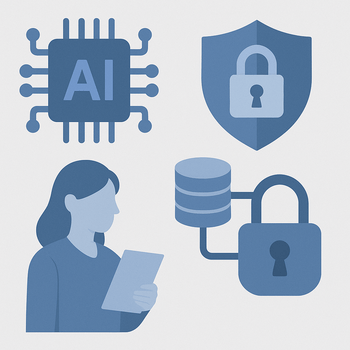How Microsoft Cloud Platform Prioritizes Data Protection and Ensures Privacy Compliance
In a world driven by data and automation, protecting personal and sensitive information is no longer optional—it’s essential. From healthcare institutions handling patient records to financial services managing transactions, data privacy has become a fundamental expectation. MCP (Modular Cloud Platform) is a standout solution that understands this responsibility and meets it with rigor. Whether you’re an enterprise customer or a developer building on the platform, you may be asking: How does MCP handle data privacy and security? Let’s take a closer look at the platform’s end-to-end security ecosystem and what makes it a leader in trust and compliance.
Understanding MCP’s Holistic Approach to Data Protection
MCP follows a structured, multi-layered approach to data protection rooted in three key principles: confidentiality, integrity, and availability. Its data protection policy is not just theoretical—it’s embedded into every function of the platform.
At the core of this approach lies MCP’s compliance with international privacy frameworks such as GDPR, HIPAA, and other regulatory bodies. But MCP doesn’t stop at box-checking. The platform actively builds privacy by design into its systems, ensuring that any data interaction—from input to deletion—is traceable, auditable, and secure.
Whether you’re storing medical records or financial data, MCP’s encryption standards and information governance measures ensure full control and oversight. This includes clear data residency options and integrated user permissions.
Data Privacy and Security in MCP: Key Mechanisms at Work
Security at MCP is not just policy—it’s engineering. Data is protected using encryption at rest and in transit, meaning even if the system is breached, the data is unreadable. Multi-factor authentication (MFA) and identity verification protocols add extra layers of defense, ensuring only verified users access sensitive systems.
Core Privacy Features Built Into MCP
Here’s a breakdown of the standout features that underscore MCP’s data-first philosophy:
- MCP Secure Infrastructure: Deployed on hardened, scalable cloud environments offering secure cloud storage with built-in failovers and redundancy.
- Audit Logging: Captures all system activities, enabling complete information governance and forensic investigation if needed.
- Real-time Security Monitoring: Employs threat detection systems with AI-based triggers to identify threats as they unfold.
- Data Loss Prevention (DLP): Enforces rules to block unauthorized sharing or leakage of sensitive information.
- Cybersecurity Framework: Aligns with global best practices like NIST and ISO/IEC 27001 to set a benchmark for cybersecurity practices.
Real-Time Data Protection: MCP’s Proactive Strategy
Speed and accuracy are vital when dealing with cyber threats. Integrated machine learning modules analyze patterns and deploy automatic responses to anomalies, allowing for effective data breach prevention.
To ensure system hardening, MCP also conducts regular vulnerability assessments, patches known risks, and uses secure coding practices to stay ahead of attackers. This ongoing improvement loop is part of MCP’s resilience strategy.
Data Security in Action: What MCP’s Protocols Look Like Daily
- Access Management: Strong RBAC enforcement combined with contextual access controls.
- Privacy Protocol in MCP: Lifecycle data management policies including secure storage, archiving, and deletion.
- Compliance Audits: Annual and surprise third-party audits ensure continued alignment with evolving data protection laws.
Answering Your Key Questions
1. How does MCP ensure user data is secure?
MCP uses multi-factor authentication, role-based access control, and AES-encryption alongside automated threat detection systems for airtight data breach prevention.
2. What encryption methods does MCP use?
Data is protected with AES-256 encryption, ensuring security both at rest and in transit against unauthorized access.
3. Is MCP compliant with data protection laws?
Yes, MCP meets and exceeds standards such as GDPR, HIPAA, and CCPA, using a privacy by design architecture.
4. Does MCP have privacy features for users?
Yes. From secure user authentication to real-time monitoring and audit logging, users have full visibility and control over their data.
5. How does MCP detect and prevent security threats?
MCP combines predictive analytics, AI-based real-time security monitoring, and automated patching to detect and stop threats before they escalate.
Guarding Against AI-Driven Security Threats
As AI becomes mainstream, so do AI security risks in healthcare and fintech sectors. MCP addresses this by incorporating AI-driven analytics with behavior-based detection to recognize zero-day vulnerabilities and prevent false positives.
Tackling AI Privacy Concerns in Sensitive Sectors
The use of AI in regulated sectors raises legitimate concerns. MCP mitigates privacy concerns with AI in healthcare by utilizing data anonymization, consent-based data models, and transparency in AI decisions. These measures support AI in healthcare data privacy and ethics compliance.
The Bigger Picture: MCP’s Commitment to Ethical Data Use
More than a security system, MCP is an advocate for responsible innovation. It encourages user empowerment by providing customizable privacy controls, transparency reports, and access logs, empowering users to make informed decisions about their data.
Conclusion
To conclude, MCP doesn’t treat data protection as an afterthought—it’s a core pillar of its architecture. Through its robust MCP data protection policy, dynamic cybersecurity practices, and future-ready tools like real-time monitoring and AI threat detection, MCP positions itself as a platform built on trust.
So, if you’ve ever asked how does MCP handle data privacy and security, the answer is: with unmatched diligence, modern encryption, and unwavering compliance. MCP doesn’t just follow the rules—it helps shape them.
